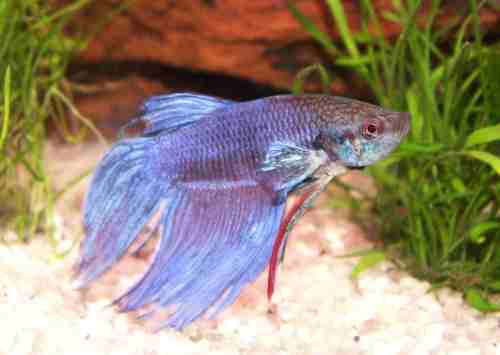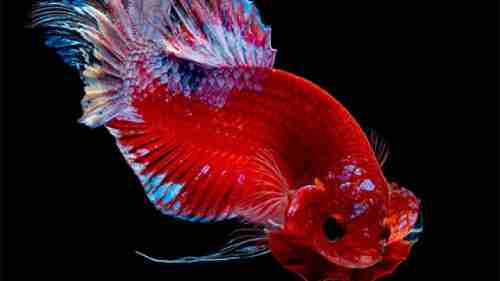Aquarists should be proactive in ensuring their pets’ welfare. Your Betta’s health and well-being will be a priority if you quickly address any behavioral or physical changes.
Betta fish are personable pets, as far as fish go. They thrive in an environment that is stimulating and allows them to observe people and the world around them. Happy bettas are alert and have a healthy appetite. They also swim in clean, comfortable waters.
These are the signs of a relaxed, happy, and healthy Betta.
- Strong, vibrant colors
The fins should be held open but not taut so that they can billow and fold in water.
- You can get your feeds easily.
- Smooth, active swimming moves
A stressed or sick betta might show these signs:
- Muted, faded color
- Clamped fins-fins can be held close to the body.
- Stress stripes are more prominent in female bettas than in males.
Fish food that has been given for the first time may be ignored or not appreciated by those with poor appetites.
- Lethargy
- Hiding
- Darting
Do Betta Fish Get Depressed?
It can be difficult to believe that fish can become depressed, no matter how much you love them. We’ve all been taught our entire lives that fish don’t have intelligence. You’ll notice that your Betta is extremely intelligent when you observe him.

It’s true that if Betta’s needs are not met, he can become depressed quickly. It’s not just for bettas.
Fish are very similar to humans when it comes to depression. They may even be crucial in helping us develop anti-depressants that work!
See Also: How To Get More Oxygen In Fish Tank
For example, a study of zebrafish showed that they would remain at the bottom if they felt depressed. They will explore as much as possible when they aren’t depressed.
Now that you are aware that bettas can get depressed, it is time to spot the signs.
What are the Symptoms of Depression in Bettas?
There are many symptoms you need to be aware of. Depression can be fatal if it isn’t treated.
Are You Uninterested in Food?
Uninterest in food is one of the most obvious signs that your Betta may be having problems. Bettas are usually very hungry, so if your Betta is not interested in food, you need to start looking to find out what the problem might be.
Once you have ruled out any illness, you can begin to treat your Betta like he is depressed.
Other symptoms include a loss of interest, eating less, and picking up food more than usual.
Lethargic and uninterested
Your Betta might also become lazy and not interested in swimming around the tank. He will most likely remain in the same spot, even if he moves. He may appear to be floating for long periods.
Do not confuse being lazy and resting. Sometimes your Betta will be lounging on a leaf. He’s likely resting when he does this. You should only worry if he doesn’t move.
He doesn’t care about you.
You’ll also notice that your Betta will be happy when you visit his tank. This won’t usually happen if a betta feels depressed.
Instead of looking at the tank from the edge, he will ignore you.
How To Make Your Betta Fish Happy

We have now identified the signs that your Betta fish are happy or sad. Let’s discuss how you can make sure they are happy.
A Good Habitat
Your Betta fish’s habitat is crucial to its happiness. Betta fish’s habitat in Southeast Asia, where they can enjoy relatively warm water, soft or semi-soft substrates, and lots of plants. They also have low water flows. To keep your Betta fish happy, replicate the natural environment in which they were raised.
You should have a Betta tank of at least 2.5 gallons. But, if you want to keep them happy, a tank of 4 or 5 gallons would be ideal. Betta fish can be very active and like to move around, so giving them lots of space is important. Betta fish aren’t fond of strong currents because they don’t swim well in strong currents. While a gentle current is fine, anything that blows them away is not.
You will also want plenty of plant life in your tank. Betta fish love to hide and swim around plants. It is a good idea to have small substrates like pebbles. You can get many decorations, such as little caves for your Betta fish to swim into. That will be a great idea. Betta fish also love to relax in the water. Many accessories can be attached to the tank, such as suction cup leaves or other small decorations. This will allow your Betta fish to have a little space for rest.
They are located
Another thing to remember is that Betta fish love to swim and are active, so keep them in an area where they can be active. It is possible to think your Betta fish isn’t interested in what is happening outside their tank. Keep your Betta fish happy in a room with lots of activity and people.
Side note: Lighting is important. Even if you don’t need special tank lights for your tanks, it is a good idea to keep them in an area with lots of sunlight. However, it is important to keep the tank away from direct sunlight and drafts.
Everything About Water
The water your Betta fish drink is another important aspect of keeping them happy. As we have mentioned, Betta fish are tropical fish that prefer warm water. The water in their tank should reflect this. If you live in a colder area, you will likely need a water heater. Betta fish prefer water temperatures of around 74°F, up to 79°F. This is far above room temperature. (Read more about the ideal temperature conditions in this article.

Betta fish prefer neutral pH levels, which is around 7.0. They also prefer water with medium hardness. This means it contains a good amount of dissolved minerals. It is important to remember that water should not contain ammonia or nitrite.
There will be some compounds in the water. However, they need to be kept at a minimum. To keep your water as pure as possible, you will need a filter. Regular water changes are a must to ensure that your water is clean, clear, free from unwanted toxic compounds and chemical buildups.
Toys
Sometimes toys are overlooked or not thought of for fish, but there are many fun toys that you can purchase which will keep your betta fish happy.
There are many decorations to choose from
To keep your Betta happy, you should add decorations to the tank. Toys, ornaments, and caves are all great options. These toys will keep your Betta occupied, and he won’t feel bored.
Make sure to add lots of caves and tunnels to ensure your Betta has many hiding places.
Here are some suggestions for the best decorations to add to your betta fish tank.
Signs Of A Happy Betta
If you do all this, your Betta will soon be happy and free from depression. It would help if you observed how your Betta acts once he is happy. If something goes wrong, you will notice it quickly. These are the signs that bettas are happy.
There are many ways to swim.
If your Betta is not resting, you should see him swimming around in the tank. You should notice your Betta moving around a lot in his tank.
Don’t be alarmed if you see him sitting on a leaf. They love this activity too. Make sure he isn’t spending too much time doing this.
A healthy appetite
This is the best indicator that your Betta’s happy. Bettas love food, so if you see him eating, he is likely happy. If you notice your pet is not eating or isn’t sick, you can move his tank.
In conclusion
If your Betta seems depressed, you need to take steps to cheer him up. You could end up causing him to become sick or even die.
You now have all you need to make your betta fish happy. If you have any questions, please leave them below. Otherwise, I wish you and your Betta a wonderful day!
Is Your Betta Fish Living Alone?
You may be interested in learning about the many tank mates that are compatible with your Betta. The Ultimate Betta Tank Mate Guide will teach you about the 68 possible tank mates for your Betta. It also lists fish that are best avoided. Learn how to make the ideal environment for your mates, how you can introduce tank mates, and more! Check it out!
If you enjoyed this article, be sure to check out the rest! You can also ask any questions in the Q&A section if you have more questions!